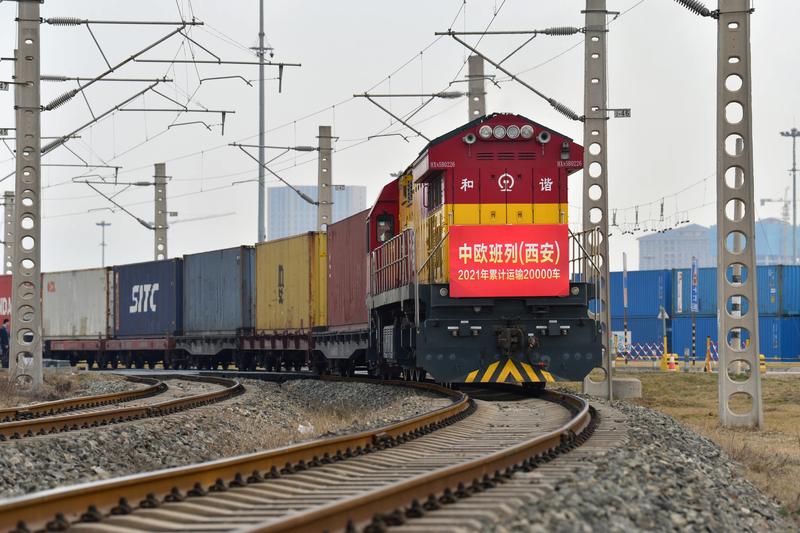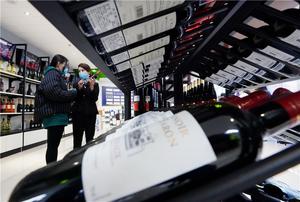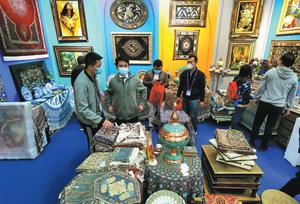Leader's emphasis on cooperation saluted
 A China-Europe freight train prepares to leave Xi'an, Shaanxi province, for Khorgas land port, Xinjiang Uygur autonomous region. (TANG ZHENJIANG / FOR CHINA DAILY)
A China-Europe freight train prepares to leave Xi'an, Shaanxi province, for Khorgas land port, Xinjiang Uygur autonomous region. (TANG ZHENJIANG / FOR CHINA DAILY)
China is a nation with a true global vision and genuine desire to build a framework of international cooperation, according to experts.
They were speaking as the two sessions, the nation's biggest annual political event, which will chart China's future course, take place in Beijing.
Politically and intellectually moribund, they (US, UK, Canada, Australia and New Zealand) are hanging on to the past. Their anti-China crusade is a lost cause. It is time for new thinking. The West must embrace the world as it is becoming, not as it was. Otherwise, it will only hasten its own decline
Martin Jacques, leading China commentator
The experts pointed to President Xi Jinping, who reiterated his commitment to a community with a shared destiny for mankind, and contrasted this with the US leader's concept of "extreme competition" between China and the United States.
Xi restated his commitment in a speech to the World Economic Forum virtual event in January.
John Ross, a senior fellow at Renmin University of China's Chongyang Institute for Financial Studies, said the contrast could not be starker.
"Xi's concept of a common destiny is one in which he recognizes that societies and countries are interdependent and need to cooperate. This creates the possibility of mutual advantage and a win-win outcome," he said.
Ross added that while US' position might not be the "zero-sum game" followed by the country's previous administration, where for one country to win, another has to lose, it fails to emphasize that countries need to work together.
"It rejects the extreme statements of the Trump administration, but does not accept that the most fundamental relations between countries should be based on cooperation, as set out by Xi," Ross said.
He Weiwen, a former economic and commercial counselor at the Chinese consulates in New York and San Francisco, said it is often underestimated how powerfully Xi's shared destiny message resonates with emerging countries, particularly those in the Global South.
"With this goal, China wants to devote itself to peace and development for all countries, leading to the prosperity of them all, whether they are big or small. It is a very constructive vision," he said.
By asserting that "America is back", He believes that the US leader remains committed to a world in which the United States maintains global dominance.
"It is not for the common interest of all countries in the world. In fact, it might be to the cost of some of them. It sees China as the greatest obstacle to it getting its own way," he added.
Koh King Kee, president of the Centre for New Inclusive Asia, a think tank based in the Malaysian capital Kuala Lumpur, agrees that China is now the country with the big vision.
"It is saying that we are all part of the global village and that no one civilization is superior to another. It believes diversity is the foundation for peaceful coexistence. China envisions a world order that is fair, equitable and just, built upon the spirit of openness, inclusiveness, and mutual respect," he said.
In his address to the WEF, Xi strongly defended multilateralism.
"Multilateralism is about having international affairs addressed through consultation, and the future of the world decided by everyone working together," he said.
"To build small circles or start a new Cold War, to reject, threaten or intimidate others, to willfully impose decoupling, supply disruption or sanctions, and to create isolation or estrangement will only push the world into division and even confrontation."
 Overseas goods are displayed at a warehouse for cross-border e-commerce in Tangshan, Hebei province. (PHOTO PROVIDED TO CHINA DAILY)
Overseas goods are displayed at a warehouse for cross-border e-commerce in Tangshan, Hebei province. (PHOTO PROVIDED TO CHINA DAILY)
Exposed weaknesses
United Kingdom Prime Minister Boris Johnson, who is due to host the G7 Summit in Cornwall, southwest England, in June, is proposing a new D10 grouping of countries. This would comprise the G7 countries (the US, UK, Germany, Japan, Canada, France and Italy) and also Australia, South Korea and India, who would be invited to join the new larger grouping.
Mario Cavolo, a leading China expert and CEO of the M Communications Group, believes that creating a D10 would only serve to make the West look weak.
"Moves such as a D10 gathering together and ganging up on China only shine a light on the already exposed weaknesses of these countries while also shining a light on how well China continues to forge ahead despite such efforts," he said.
Martin Jacques, an academic and author of When China Rules The World, said the D10 idea was driven by the so-called Five Eyes security grouping of the US, UK, Canada, Australia and New Zealand.
"This is not a statement of strength, but rather weakness and retreat-a shrinking Anglo-Saxon faction. They share Anglo-Saxon roots, four were settler colonies, and English is a common (language) to all," he said.
"Politically and intellectually moribund, they are hanging on to the past. Their anti-China crusade is a lost cause. It is time for new thinking. The West must embrace the world as it is becoming, not as it was. Otherwise, it will only hasten its own decline."
Wang Huiyao, president and founder of the Center for China and Globalization, or CCG, an independent think tank based in Beijing, believes it will be difficult for D10 to get off the ground.
Having just taken part in the Munich Security Conference, Wang said the ideas underlying such a new grouping were "far from the mood" of that meeting.
"It is just based on Cold War ideology trying to use democracy as a dividing line, when that line in itself is far from clear. The old NATO and Warsaw Pact era has well and truly gone," he said.
"If there is to be a new grouping, the G7 should add both China and India and also bring back Russia. That would make far more sense."
Ross, from Renmin University, who used to be economic adviser to former mayor of London Ken Livingstone, agrees that to actually work, any new grouping must include China.
"The proposal by Britain is, in fact, an admission that the old grouping of the G7-that solely of the old advanced economies-is now too weak to be a deciding factor in world politics and economics. This was shown during the international financial crisis in 2008, after which the G20, to which China belongs, de facto replaced it."
 A woman in La Paz, Bolivia, is given a shot of a COVID-19 vaccine from China. (PHOTO PROVIDED TO CHINA DAILY)
A woman in La Paz, Bolivia, is given a shot of a COVID-19 vaccine from China. (PHOTO PROVIDED TO CHINA DAILY)
Europe, in particular, seems reluctant to follow a containment strategy toward China. The European Union signed a Comprehensive Agreement on Investment with China in December, and clearly sees the value of its commercial relationship with the country.
China is also forming an increasingly close relationship with Central and East European countries-those that are nearest to it on the Eurasian land mass, and also a key link for the Belt and Road Initiative.
Addressing the China Central and Eastern European Countries Summit last month, President Xi said China would aim to import US$170 billion of goods from CEE countries over the next five years. Since the formation of the cooperative organization nine years ago, China-CEE trade has grown by 85 percent.
"With its focus on real results, China-CEEC cooperation has served the purpose of supporting our respective development and bettering the lives of our people," Xi told the summit.
Ross feels that Europe as a whole is taking a different position to China than the UK.
"Britain, after Brexit, has moved further to subordinate itself to the US-banning Chinese company Huawei from its 5G system and embarking on provocative measures such as announcing it will send an aircraft carrier to the Pacific," he said.
"But, of course, the EU is a much more significant economic and political force than Britain, so overall it may be said that the EU and Europe are refusing to go along with a new Cold War against China."
He, the former trade diplomat, said Europe wants good relations with China and has no interest in perpetuating US global hegemony.
"The US wants to contain China to maintain its world hegemony. That, however, is the US' concern and not Europe's. A large part of Europe's economic future is dependent on Asia, with China very much the center of that. It would be stupid to sacrifice Europe's future just for the interests of the US," he said.
Parag Khanna, a global strategist and author of The Future is Asian, said China is a major opportunity for Europe, which it is not going to miss out on.
"The EU wants to take the lead on exports to China. It wants to gain access to asset management and other activities in China, and also gain a greater market share in Belt and Road-related projects," he said.
Khanna said that despite some of the political rhetoric from Washington, US companies want to do the same, with a number of leading Wall Street names establishing major operations in Shanghai over the past year.
"In this sense, Europe competes directly with the US. Geopolitical allies can be geoeconomic competitors," he added.
Xi made clear in his address to the WEF the importance of prioritizing the Global South's development needs.
"Today, inequality continues to grow, the North-South gap remains to be bridged, and sustainable development faces severe challenges. As countries grapple with the pandemic, their economic recoveries are following divergent trajectories, and the North-South gap risks further widening and even perpetuation," he said.
 Iranian products attract visitors to the 17th China-ASEAN Expo in Nanning, Guangxi Zhuang autonomous region, in November. (YU XIANGQUAN / FOR CHINA DAILY)
Iranian products attract visitors to the 17th China-ASEAN Expo in Nanning, Guangxi Zhuang autonomous region, in November. (YU XIANGQUAN / FOR CHINA DAILY)
Vaccines drive
Unlike many rich Western countries, China has made its vaccines available to the developing world even before supplying them to its own citizens, recognizing the former's greater need. The virus within its own borders has also been contained.
China has supplied vaccines to many African countries and to Latin America, Southeast Asia and CEE countries, some of which are EU members.
On Feb 18, State Councilor and Foreign Minister Wang Yi made clear China's approach at the UN Security Council meeting, saying it was wrong that high-income countries had almost all the vaccine supply, and the poorest none.
"We should come together to reject vaccine nationalism, promote fair and equitable distribution of vaccines, and in particular, make them accessible and affordable for developing countries, including those in conflicts," he said.
Koh, from the Centre for New Inclusive Asia, said China has led the way in fully signing up to the World Health Organization-led COVAX vaccination program right from the start in October, in contrast to the US, which only signed up in January.
"In prioritizing the delivery of vaccine to developing countries, China is upholding its world vision that mankind is a community with a shared future. Coronavirus is a common enemy of mankind. No one is safe until everyone is safe," he added.
Cavolo, the China commentator, said the country is in a strong position to lead on this issue because it has successfully controlled the virus, emerging economically stronger as a result.
He said China's work in supplying vaccines will only serve to bolster its relations with developing countries.
"Will such help, when needed, lead to the formation of stronger bilateral relationships and greater cooperation in the future? Of course it will," Cavolo said.
Ross believes that in contrast, the West is undermining its relationship with the Global South.
"The position taken by the 'rich' countries on vaccines is a disgrace and shows the complete hypocrisy of their claim to stand for human rights," he said.
"They are hoarding vaccines for themselves, therefore limiting their supply to developing countries. China, together with Russia, on the contrary, are supplying hundreds of millions of doses to developing countries-an enormous step forward in human rights."
Whatever the outcome of the global vaccine rollout, the world faces major challenges over the next decade in relation to the post-pandemic recovery, huge debt levels and climate change.
Wang, from the CCG, said it should be evident from the two sessions that many of the bigger ideas are coming from Beijing.
"China understands the big picture. It is not weighed down by ideology, and believes so much more can be gained by greater international cooperation," he said.


